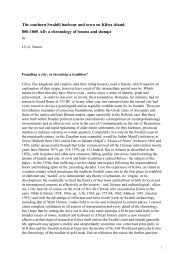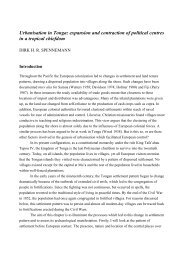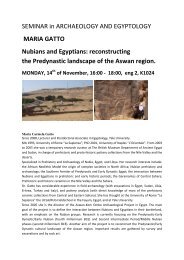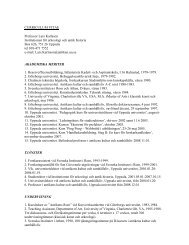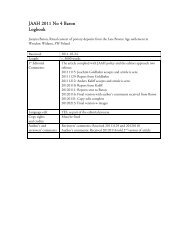Beowulf - Institutionen för arkeologi och antik historia
Beowulf - Institutionen för arkeologi och antik historia
Beowulf - Institutionen för arkeologi och antik historia
Create successful ePaper yourself
Turn your PDF publications into a flip-book with our unique Google optimized e-Paper software.
question. This is certainly a matter of significance by association rather than a matter<br />
of proving a certain conceptual value, and we must satisfy ourselves with the impression<br />
that the examples are sufficiently complex to give substance to our discussion.<br />
The modern usage of good is, on the other hand, fairly clear and we are therefore<br />
running the risk, pointed out by Jones in connection with the word honour (1959, pp.<br />
3 f.), of being trapped in our anachronistic views upon the meaning of the word.<br />
Likewise, and as pointed out by John Casey in his analysis of Pagan virtue (1990,<br />
pp. 199 ff.), our mixture of Kantian and Christian ideas about the character of the<br />
good, goodness and what good actions are, tends to prevent us from seeing the<br />
qualities of Pagan virtues (cf. Casey 1990, pp. vi ff.).<br />
If we depend on earlier historical research then the meaning of the word good<br />
can, with the exception of the rune-stones, only be inferred from dictionaries or from<br />
by-products of the analysis of the appellatives þegn and drængr. There is in other<br />
words no research tradition to build on when it comes to selecting texts and so, also<br />
for this reason, a specific choice is no better than one based on common sense and<br />
texts are useful only in a general discussion.<br />
The two Anglo-Saxon texts, <strong>Beowulf</strong>—mainly the first part—and the poem<br />
about the Battle of Maldon, have been chosen because they cover the whole period,<br />
c. 500 to 1000 AD, in a conscious literary form. <strong>Beowulf</strong> is in many ways a didactic<br />
poem (cf. Outzen 1816; Lindqvist 1958, pp. 117 ff.; Haarder 1975, pp. 106 ff.)<br />
and it draws upon the whole of the traditional and complex usage of good. Its usage<br />
is so consistent that it is hard to imagine that it should be part of the redaction made<br />
by the scribes who produced the manuscript around 1000 AD. This is attested not<br />
least by the fact that the second part of the poem is a complement to the first part<br />
reflecting a Christian attitude to the concept of goodness much more contemporary<br />
with the manuscript as such than the first part. In <strong>Beowulf</strong>, good is an essential<br />
concept used in two different ways that taken together reflect a development. It is<br />
hardly reasonable to suggest that scops or scribes manipulated the whole text to<br />
make it appear as that which indeed it seems to be, namely, two juxtaposed, chronologically<br />
separated oral poems written down on parchment.<br />
The poem about the Battle of Maldon also suggests a change in the approach to<br />
the concept of Goodness. Here there are some structural similarities in the usage of<br />
the word good, but the concept is deprived of much of the complexity that characterises<br />
its usage in the first part of <strong>Beowulf</strong>. In this contemporary, within a generation<br />
or two, description of a crisis for the good in connection with a lost battle c. 1000 AD,<br />
we find an up-to-date view upon the concept that differs considerably from the ideal<br />
in the first part of <strong>Beowulf</strong> even though its affinities with Pagan and martial rather<br />
than Christian ideals are obvious.<br />
Turning to the Italian poet Venantius Fortunatus, we find a substantial part of the<br />
early <strong>Beowulf</strong>ian ideal in his four poems about the Merovingian Duke Lupus, poems<br />
which can be dated to the decades around 570 AD. Although they are a Late Classical<br />
52



